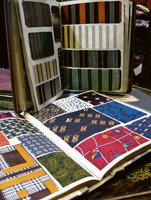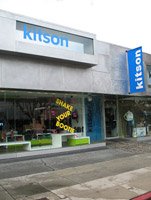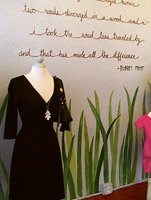California Retailers That Set the Trends
Retail has always been big in California—but recently it’s gotten even bigger.
There are more categories of merchandise than in the past. The consumer market is more segmented than ever, and a myriad of stores have opened to embrace a dizzying demand.
Over the past year, California consumers and businesses have witnessed a wave of stores to meet the challenge of the highly complex market, ranging from a revitalized department- store sector to aggressive fast-fashion retailers. There are boutiques to satisfy every demand, from couture to ecologically friendly clothing and premium boutiques in far-flung suburbs.
For this year’s “Shops to Watch” profile, California Apparel News takes a look at some of the businesses that are changing California’s retail landscape.
Streetwear’s New Address: Fairfax Avenue
Trade shows know the importance of contemporary streetwear. In the past few years, shows such as Agenda and United Tradeshow have become buzz-worthy events due to their encyclopedic focus on the category. Even one of the dominant players in the trade show game, the MAGIC Marketplace in Las Vegas, offered a giant 107,000- square-foot section dedicated to this burgeoning style at its most recent show in February.
Yet more than 18 months ago, Los Angeles began to be the destination for a central concentration of boutiques specializing in the style—think of it as the Rodeo Drive of contemporary streetwear. During 2006 and 2007, some of the top designers of the contemporary streetwear scene, such as Fresh Jive and The Hundreds, opened boutiques on Los Angeles’ Fairfax Avenue.
The eponymous The Hundreds boutique, Fresh Jive’s Reserve shop and a few other streetwear stores have changed the area’s look. Along with Orthodox Jews shopping at traditional businesses and nightclubbers going to Largo, Fairfax now is the site of streetwear fanatics lining up in front of stores such as The Hundreds to get exclusives on T-shirts and sneakers.
The contemporary streetwear stores of Fairfax—which also include Flight Club, SLB and Supreme—will reportedly get a few more streetwear neighbors in the next year. Rick Klotz, founder of streetwear brand Fresh Jive and co-owner of Reserve, said he hopes that the concentration of stores could make a statement for the retail of streetwear. “There’s strength in numbers,” he said.
Reserve 420 N. Fairfax Ave. Los Angeles, CA 90036 (323) 651-0131
The Hundreds 7909 Rosewood Ave. Los Angeles, CA 90048 (323) 230-7421
Lifestyle Retailer to Watch: Free City Supershop
The way Ron Herman talks about the Free City Supershop it sounds more like a movie or an avant-garde art gallery than a store.
Herman, one of the pioneers of Los Angeles specialty shops and owner of Free City said that the 800-square-foot retail space in Malibu, Calif., was meant to “inspire, challenge and entertain.” It also might be a place to rethink what a boutique means.
The boutique sells Free City T-shirts, sweats and apparel that have been offered at Ron Herman’s venerable Ron Herman/Fred Segal Melrose boutique in Los Angeles since 2002. But the Malibu store, which opened in August 2005, also deals in items not typically considered a natural fit at apparel stores—including teepees, vinyl records and bicycles—all for sale at Free City.
Teepees aside, the boutique also seems to live up to its name, because it specializes in tweaking other boundaries. There is no stockroom— a necessity at other stores—rather, goods are delivered daily. If people milling about the store are a little thirsty, they can squeeze some oranges by the cash register and make orange juice.
Herman said that there was a good chance that more Free City Supershops could be built, perhaps in Hollywood, Calif., or the isolated artist colony of Marfa, Texas. But the reason for the Free City concept continues to burn brightly in Malibu, according to shop creator Nina Gardono. “It’s an environment. It’s a personal experience. It’s your Free City,” she said.
Free City Supershop 368 Cross Creek Rd. Malibu, CA 90265 (310) 456-5651
Fashion Retailers and Reference Library to Watch: The Way We Wore
Designers have long visited Los Angeles to study youth- and contemporary-fashion trends. But since May 2004, they’ve been coming to the city to examine fashion trends from the 1950s, the 1920s and even the Victorian era.
Seventy-year-old swatches, 19th-century bows and ethnic costuming from around the world are stocked at The Way We Wore, a boutique and for-profit library that may be one of the only businesses of its kind in California. It has has been attracting designers from all over the world, such as Zac Posen, Tory Burch and the design team of Marc Jacobs.
After a more-than 12-year career collecting and dealing in vintage fashion, The Way We Wore owner Doris Raymond stocked her boutique with many perfectly preserved pieces of fashion history.
Clients typically contact her one week or two before visiting. They tell her what era and what sort of themes they want to research. Then Raymond will assemble some of that theme’s best specimens.
Designers typically use their research sessions, usually two hours, to pour over swatches, trims and other vintage items that Raymond arranges on the tables of the 1,500-squarefoot library section of her library store.
The Way We Wore library earns revenue through sales of antique swatches, with a $500 minimum per swatch, yet time will tell if Raymond will be able to tell the fashion future. She said that in the past year many of her clients have requested to research pieces from the 1960s and 1980s.
The Way We Wore 334 S. La Brea Ave. Los Angeles, CA 90036 (323) 937-0878
Luxury Department Store to Watch: Bloomingdale’s
The department-store sector has bounced back in the past few years, and the venerable nameplate Bloomingdale’s has particularly added luster to the once-fusty name of department stores in California.
In a quick pace, Bloomingdale’s constructed a five-level, 330,000-square-foot flagship store in San Francisco in September 2006. Two months later, it opened a store in San Diego. On May 4 it debuted a three-level South Coast Plaza store, which boasts of carrying even more high-profile designer names than the magisterial San Francisco store.
Michael Gould, Bloomingdale’s chairman and chief executive, said that if the South Coast Plaza store is deemed successful, his company most likely will build more stores in California.
Whether or not Bloomingdale’s expands further, competition has been heating up for department stores and large multi-line specialty retailers.
Last October, Seattle-based Nordstrom opened one of its biggest stores, a three-level, 200,000-square-foot flagship at the Westfield Topanga shopping center, 27 miles north of Los Angeles. A Neiman Marcus also is scheduled to open at Topanga in 2008.
Barneys New York also has been expanding in California. Some highlights of its expansion schedule include debuting a Barneys Co-Op at South Coast Plaza in 2005 and at The Grove in Los Angeles in 2006.
No matter how spectacular the competition, Gould said, there’s always another customer. “We’re looking at a lot of opportunities,” he said.
Bloomingdale’s South Coast Plaza 3333 S. Bristol St. Costa Mesa, CA 92626 (714) 824-4600
Unconventional E-tailer to Watch: BlueBee.com
If the word “alternative” dropped from Marty Bebout’s mouth, he might be talking about his e-commerce Web site (www.bluebee.com).
In November 2004, Bebout and business partner John Doucette started the Web site as a means to give the world a taste of their designer specialty Blue Bee store, based in the exclusive California beach town of Santa Barbara.
They gave women and men in areas as far flung as New York, Chicago, Michigan, Los Angeles and San Francisco a rare chance to shop online for the latest designer merchandise from Paul Smith, Alexander McQueen and Martin Margiela. They also organized their Web site in an atypical way. They opted to provide a tightly edited choice of the designers’ wares instead of a long list of brands and categories. Extensive brand lists, they contend, can make online shopping an overwhelming experience.
Their result is a Web site where consumers shop for the edited merchandise by a specific store, such as Blue Bee Jeans or Blue Beetle, and not by plain categories such as “jeans” or “T-shirts.”
Their support of an alternative found success. When they started the effort, the Web site had no employees. By 2007, it had 14 employees. Bebout said that his Web site’s different organization has confused some online shoppers. But he and Doucette have no plans to change their experiment. They will introduce e-commerce shop Blue Bee Luxury (www.bluebeeluxury.com) this summer.
Blue Bee e-commerce www.bluebee.com
Atelier to Watch: Lloyd Klein
Los Angeles fashion is best known for denim, T-shirts and sexy sweats, but its reputation may have changed a bit on Nov. 14, 2006, when the Paris-based haute couture designer Lloyd Klein moved his headquarters to Los Angeles.
While couturiers Richard Tyler, Kevan Hall and Eduardo Lucero have already made the world realize that high fashion could thrive in Los Angeles, Klein joined this good fight with European panache.
He moved his atelier into a chateau-like Gothic building on Beverly Boulevard, which features some fearsome roof-top gargoyle statues, medieval-style murals inside and luxurious gray suede covering the interior walls.
The grand setting provides a backdrop to Klein’s cocktail dresses and gowns, which are made unique by the designer’s intricate beading, Grecian bodices and classic draping.
Many of California’s high-fashion aficionados have embraced him. He was the featured designer in the high-fashion consumer event 2007 Fashion Week El Paseo, held in March in Palm Springs, Calif.
Klein also is looking to expand his business. He is investigating licensing deals for fragrance and casualwear, according to John Arguelles, president of Lloyd Klein’s company.
However, the presence of Klein’s atelier is good news for the high-fashion scene, said Octavio Carlin, a couture designer who also opened an atelier this past December. “It makes things so much better,” Carlin said. “It’s going to make people look for what else is new in their backyard.”
Lloyd Klein Couture Laboratory 7415 Beverly Blvd. Los Angeles, CA 90036 (323) 549-9999
Pioneer Stores to Watch: Java Jean Bar, Metropark, M.Fredric
For the past few decades, well-off people have been building houses, in many cases mansions, in Southern California’s far-flung suburbs such as Valencia and Anaheim Hills. But it has only been in the past few years that entrepreneurs have been seriously scouting opportunities for fashion boutiques in these suburbs.
Small entrepreneurs are typically the retailers who take the first step in developing afashion market in these under-retailed towns. In Anaheim Hills, a wealthy suburb of Anaheim, Calif., novice boutique owner Michelle Macis opened Java Jean Bar on Dec. 17.
Macis sells premium-denim brands such as Chip & Pepper, Diesel, Replay, Seven for All Mankind and Cheap Mondays in a place where these brands have not been offered. Macis gambled that enough Anaheim Hills residents would prefer to spend their money a few blocks away from their homes rather than traveling on traffic-choked freeways.
Some larger retailers are also prospecting for retail opportunities in distant suburbs. Mall-based fashion retailers Metropark, based in City of Industry, Calif., and M.Fredric, based in Agoura Hills, Calif., are both on a mission to bring city fashions to the well-off folk who live far away from town centers.
Java Jean Bar 116 S. Fairmont Blvd. Anaheim Hills, CA 92808 (714) 685-0800
Metropark Galleria at Tyler 2045 Galleria at Tyler Riverside, CA 92503 (951) 353-2220
M.Fredric The Promenade at Westlake 160 Promenade Way Westlake Village, CA 91362 (805) 777-1007
Brand Builder to Watch: Kitson
All systems are go at Kitson.
Kitson made headlines in its field in the past year. The high-profile denim and popculture boutique opened new stores, specifically separate men’s and kids’ boutiques, on its home turf of Los Angeles’ Robertson Boulevard. It even opened international boutiques in locales such as London.
But Kitson owner Fraser Ross also jumped into a zone many retailers never venture. Kitson became a manufacturer. Kitson jeans and shoes sell at a diverse group of retailers, from specialty department store Nordstrom to the Just Us Girls boutique in Valencia, Calif.
Ross forecast that the footwear division alone could earn more than $20 million in 2007. Both the jeans and the shoes are manufactured by Manhattan Beach, Calif.–based Skechers U.S.A. Inc. Kitson licensed the name to the company. Ross said that he works on the design aspects of the Kitson product.
According to business analyst Richard Giss, the sky could be the limit for the Kitson brand.
“There isn’t a natural limitation on a brand,” Giss said. “But there is a limitation placed by customers. Once they don’t understand what a brand means, opportunities close down.” Giss is a partner in the consumer business practice of the Los Angeles office of Deloitte & Touche LLP.
Kitson 115 S. Robertson Blvd. Los Angeles, CA 90048 (310) 859-2652
Retail Trend to Watch: Green Business
American consumers have embraced organic foods and groceries—to the tune of $14.6 billion in 2005, according to the Greenfield, Mass.–based Organic Trade Association. But will these same customers also shop at fashion stores that specialize in ecologically friendly styles?
Retailers such as Delilah Snell are finding out. She debuted The Road Less Traveled boutique in Santa Ana, Calif., in May 2006. Business has been good enough that she’s expanded from her initial space of 500 square feet to 1,700 square feet in less than one year. She achieved this growth by selling environmental products in Orange County, a region that has been traditionally considered politically conservative.
While she also sells organic office supplies and homewares, 500 square feet of her operation are dedicated to green fashion. The fashions range from yoga wear to basics, some contemporary clothes and, yes, a few pieces that would fit in at a Grateful Dead concert.
Price points range from $24 to $160 for labels such as Random Nicole, Earth Creations and Moral Fervor. Snell claims that her consumer ranges from college students to grandmothers, attorneys, punk rockers and moms.
While Snell has been building her boutique, like-minded stores have been popping up around California. There is Undesigned in Los Angeles, and there are larger operations such as outdoor-apparel maker Patagonia, which operates more than 16 stores around the United States, and the Linda Loudermilk boutique, which will reportedly debut in Los Angeles this summer.
These stores have been able to open in the past year because only recently have there been enough environmentally friendly fashion labels to fill up a boutique, Snell said.
Yet will there be enough consumers to support ecologically spirited boutiques, even if the Academy Award–winning documentary “An Inconvenient Truth” fades from memory? “There are specialty boutiques for everything else. Why not green fashion?” Snell asked.
The Road Less Traveled 2202 1/2 N. Main St. Santa Ana, CA 92706 (714) 836-8727
Local Fast-Fashion Retailer to Watch: Forever 21
Americans would have to surrender the fast-fashion market to the Europeans if it weren’t for one company—Forever 21.
The Los Angeles–based retailer is in its second decade of high growth, with more than 400 stores in the United States and an increasingly high profile in important foreign markets, including Canada. On April 25, it was announced that Forever 21 will open a flagship store in Toronto’s Eaton Centre. It also has stores in overseas markets such as Dubai and Singapore.
It seems to be forever expanding because the company consistently focuses on one measure. It manufactures and sells clothes with a designer look at a Wal-Mart price.
The company’s ambition is on a growth spurt, too. It has aspired to an emporium- style grandeur by opening a 40,000-square-foot marble-tiled flagship store in July 2006 in Pasadena, Calif. It’s also identified burgeoning new retail markets by debuting accessories store For Love 21 and edgier concept store Heritage 1981.
A For Love 21 opened in February at the Glendale Galleria shopping center in Glendale, Calif. The company has opened Heritage 1981 stores in some of the 44 former Rampage stores that Forever 21 purchased in 2005 from San Diego–based retailer Charlotte Russe Inc. for $14 million.
Forever 21 35 N. De Lacey St. Pasadena, CA 91103 (626) 792-7473
























